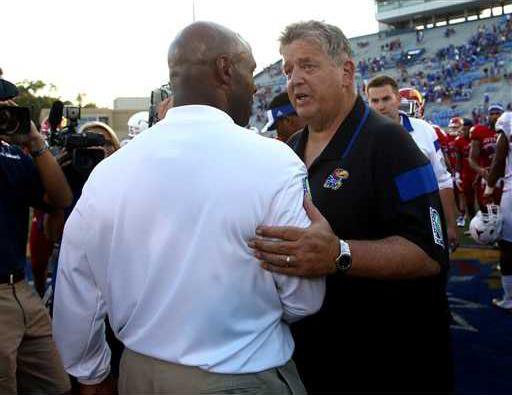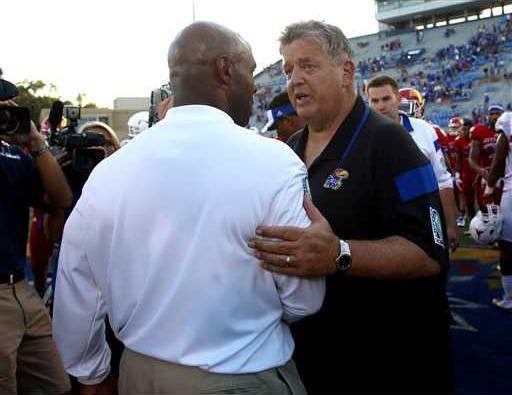LAWRENCE — Charlie Weis arrived at Kansas full of bravado, promising dramatic changes within the long-suffering program. Players were dismissed, offenses and defenses were scrapped. Assistant coaches were hired, fired or simply reassigned.
In the end, the one thing that needed to change — on-field results — stayed the same.
Weis was fired four games into his third season on Sunday, one day after a 23-0 loss to Texas on homecoming left the brash coach with a 6-22 record in his second head coaching stint.
Weis, who earned a reputation as an offensive mastermind with the New England Patriots, was fired by Notre Dame in 2009 after five seasons at his alma mater.
"I normally do not favor changing coaches mid-season," Kansas athletic director Sheahon Zenger said in a statement, "but I believe we have talented coaches and players in this program, and I think this decision gives our players the best chance to begin making progress right away."
Defensive coordinator Clint Bowen will serve as interim coach of the Jayhawks, who are 2-2 on the season. They play at West Virginia on Saturday.
It was Zenger who fired Turner Gill after two moribund seasons, and who proclaimed upon the hiring of his replacement, "I set out to find the best and I found Charlie Weis."
At the time, Weis had been two years removed from his debacle at Notre Dame. He served the first year as a Kansas City Chiefs assistant, helping the team return to the playoffs. But the following year, as offensive coordinator at Florida, Weis presided over a unit that had struggled to score.
That didn't change once Weis arrived in Lawrence.
After dismissing a slew of players for various rules infractions, Weis rebuilt the roster around a number of Division I and junior college transfers. But each time he thought he had found an answer, especially at quarterback, everything seemed to backfire.
Quarterbacks Dayne Crist and Jake Heaps, two high-profile transfers, were benched for poor play in favor of less-heralded players. Wide receiver Justin McKay, once one of the nation's top prospects, has struggled to produce over two seasons.
Throw in a series of devastating injuries, including season-enders to the Jayhawks' top two running backs in fall camp, and the team was woefully overmatched.
Kansas struggled to beat lower-division Southeast Missouri State in its opener, and then was routed 41-3 by Duke. There were rumors then that Weis would be fired if the Jayhawks did not beat Central Michigan the following week, and it took an inspired defensive effort and two fourth-quarter touchdowns for them to eke out a 24-10 victory.
Ultimately, it bought Weis one more week.
"I appreciate what Coach Weis did with several facets of our football program," Zenger said, "but we have not made the on-the-field progress we believe we should. I believe new leadership gives our coaches and players the best chance to make a fresh start."
Kansas chancellor Bernadette Gray-Little said she supported the decision.
"As we continue to elevate the national stature of the University of Kansas, our pursuit of excellence extends beyond our research and instructional missions," she said. "Alumni, students, fans and supporters expect that Kansas football will match the other areas in which we excel."
That hasn't been the case for many years.
Kansas hasn't had a winning record since 2008, the nest-to-last season under Mark Mangino — now an assistant at Big 12 rival Iowa State. The Jayhawks have only beaten four teams from the Football Bowl Subdivision in the past four seasons. And perhaps most important, the miserable play has resulted in vast stretches of empty seats at Memorial Stadium.
Those seats will need to be filled by Weis's successor. Kansas is on the hook for the remainder of his five-year contract, which guaranteed him $2.5 million annually.
"The team was slugging it out," Weis said following Saturday's loss to the Longhorns, when asked about the waning support. "I think the only reason to not support a team is when a team throws in the towel, and I think our team has shown no evidence of that."
The program hadn't shown much evidence of progress, either, and it cost Weis his job.





